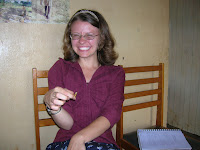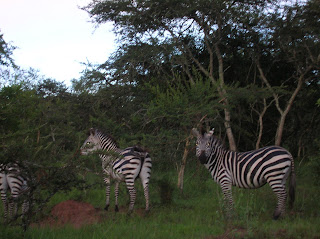Note – whenever talking about a specific child, I will not give the full name, just to protect their identity as a vulnerable child.Last week, three boys walked into the drop in center. Although they said they were 11 and 12 they looked about 8 or 9. One was M, who had been to Buddukiro before. When he was on the streets before, he was hit in the head by one of the townspeople, and almost died. The other street kids got him to the police, and Buddukiro was able to help with him to get medical treatment and to prosecute the person who injured him. After recovering, he was resettled back in his home village. Unfortunately, he decided that he liked town better than his home situation, so he returned, bringing two friends with him.
F and F were friends of M’s from his home village. They each had a very dramatic story about why they left home, neither of which was true, as we found out later. (In her database, Aida actually has special pages to record each new version of the child’s story as they tell it, and as she observes it during home tracing.) Buddukiro places a large emphasis on resettling the children back in their home communities as soon as they are willing to go. After a counseling session with Aida, all three boys indicated that they did indeed want to go home, so we arranged to resettle them the next day.
The next morning, when they didn’t show up, one of the staff was able to find them in town. They had been waiting for reimbursement for some small work they did for a shopkeeper, who was now refusing to pay. They finally came along to the center, and the journey home began, and as it turned out, it certainly was a trip.
Pic- The boys taking part in the music lesson with Robert just before their departure. It was amazing to see them light up and express themselves. F, F and M are the small boys.
 Taxi I
Taxi IMe, Aida, and the three boys left the center, walked down the road, and piled into one of the white taxi cars that is constantly running on the main road between Masaka and Nyendo. This was the first of several stages of the trip. We had been driving for a few minutes when the driver realized that there was a police check point set up ahead. He apparently didn’t have his license in order, because he proceeded to throw the car into reverse at full speed, in search of an alternative route.
Unfortunately, he didn’t realize that the brush on the side of the road was concealing a huge ditch, and suddenly we were sliding backwards straight down the hill! At the bottom we were all fine, but the car was pretty well stuck. We got out and headed up the hill in search of another. From the distance, I saw about 10 of the workers who were around that area lifting the car straight up out of the ditch, and sending the driver careening off again on his way.
Boda INo other car wanted to take on as many people as we were, given that there was the police checkpoint ahead. We walked for a little while, and then finally found some boda boda drivers willing to take us. Boda bodas are motorcycle taxis that can comfortably fit the driver and one other person on the back seat, though I’ve seen a family of four squeezed on there. We put me and one boy on one, and Aida and the other two boys on the other (we ladies of course very properly seated side-saddle.)
Taxi IIThe boda bodas drove about 10 minutes down the road to the place where the next set of white taxis depart for the town we were going to in the west. As we dismounted, there were about 15 ‘handlers’ who swarmed around us trying to arrange our transport. We followed one, and piled in for the 2 hour drive to the main town near the boys’ village. Now, when I say piled in, I mean piled in. In that normal-sized car, we were seven people in the back (4 adults, 3 kids), and four in the front (including the driver). One of the Ugandan men sitting next to me commented that he had rarely ridden so comfortably- usually there are 8 adults in the back!
As we started down the road, we noticed how grey and heavy the sky looked. “Uh oh”, I thought. Sure enough, it soon started to POUR down rain, just as we left the paved part of the road. As we started slip-sliding up and down the hilly and rutted roads, I started to pray. Aida later told me that she did also! While we prayed, the Ugandan guy next to me started to doze off, obviously completely comfortable and at ease! The windows had been closed and were soon fogged up on the inside and mud-coated on the outside. I won’t even mention how uncommon deodorant is in Uganda, because mine failed even me at that point. About halfway through the drive, the boy on my lap started to look mighty green around the gills, and I got him a plastic bag just in time to catch his breakfast.
BodaIIWe pulled into the town and extricated ourselves from the taxi. One of the shopkeepers was kind enough to offer us a place to wait out the worst of the rain before boarding our next set of bodas up into the boys’ village. After about 30 minutes, we got on headed a ways up the path to the first boy’s home. Now, I’ve been told that Ugandan women have even been seen breast feeding on boda bodas, but I’m not quite so adept yet, and so I held on for dear life as we bumped up and down the dirt path.
The great escapeWe came to M’s house first. Aida went inside with him and his father, leaving me outside with F,F, and the two boda drivers. At one point, I saw F start to go up the hill to the brush. I thought to myself, “oh, he must have to go to the bathroom after such a long ride, I’d better avert my eyes.” Silly, gullible Tammie. Aida came out and said, “where’s F.” Oh dear, he ran away! I felt awful, and then of course it started to pour down rain again, and I’m thinking “this kid is going to get pneumonia and die, and it’s all my fault!”(Thankfully it turned out he ran home, so we found him there when he went to visit his family. Chalk it up as a lesson learned I guess!)
As we visited each boy’s home, Aida did a lot of counseling to them and their families in Luganda. She was warning them of the dangers of the street, reminding them of the their responsibilities as parents, and strategizing with them about ways to prevent the child from returning. It was pretty emotional and challenging.
Pic - F, the "runaway", standing in front of his home with his brothers and sisters.
 Main reflections/realizations from the day:Wow, I can see why follow up is a challenge.
Main reflections/realizations from the day:Wow, I can see why follow up is a challenge. One of the areas where Buddukiro came out weak in their recent program evaluation was in the area of follow up services. Now I can see why this would be a challenge. Five hours, three homes, and many layers of mud later, as well as several thousand shillings lighter, I came home pretty exhausted. With Aida as the only social worker on staff at the moment, giving the kids the follow up needed to make it a successful resettlement is a huge task.
Wow am I gullible. I tend to wear rose-colored glasses, but those need to come off. This is a tough population, and the kids are very traumatized and tend to pick up bad habits on the street. In her database, Aida actually has several different pages to record the different versions they give of their stories. It takes a knowledge of the way they operate to find the balance between being approachable and kind, but tough enough not to be bamboozled (like that word, eh?)
Wow, this is for real. Seeing the homes the boys returned to broke my heart. I could see why they would find some appeal on the streets, where at least they can earn a little money to eat well. I was struck by how these are real lives being affected, right now, and into their future. Providing a quality intervention is really important to helping the kids find their way through their present difficulties so they can conceive of greater possibilities for the future.














































